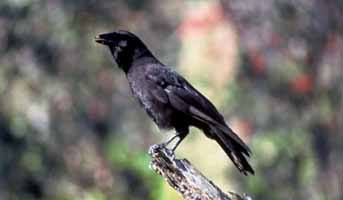(单词翻译:单击)
听力文本
This is Scientific American — 60-Second Science. I'm Jason Goldman.
Got a minute?
Once upon a time, on the big island of Hawaii, it would not have been unusual to hear:
[wild Hawaiian crow call]
That's the call of the Hawaiian crow. It's is a critically endangered species, now extinct in the wild after decades of habitat loss, persecution by farmers, and invasive diseases. In the mid-1990s, wildlife biologists rounded up the few surviving crows and put them into a captive breeding program. Today, Hawaiians can once again hear the calls of more than one hundred Hawaiian crows – or 'alalā, as it is called there – but only in aviaries.
[aviary crow call]
Researchers once focused their efforts primarily on breeding and husbandry. But now they need to know more.
"And now that they are doing so well, and it's at the point where they could be in the wild again, now we can look at their vocalizations and their behaviors and things like that."
University of Hawaii bioacoustics researcher Ann Tanimoto. Those other aspects—culture, if you will—are critical for a species as socially complex as the 'alalā.

Tanimoto and her team made recordings of captive-bred 'alalā pairs at the Keauhou Bird Conservation Center in Volcano, Hawaii, and compared them to recordings made in the early 1990s by Fish and Wildlife Service biologists of the last few wild pairs.
"The wild have more, almost double the number of alarm calls, than the aviary 'alalā do. And they also have these really cool territorial broadcast calls they do in the wild
[Wild territorial call]
that weren't found in captivity."
The absence of the territorial call in captivity makes good sense, because captive birds have different territory demands than wild ones. It also makes sense that they would have fewer alarm calls, because captive birds don't experience the threat of predation. The study was published in the journal Animal Behaviour.
"So we think that their vocalizations that are similar, aviary and wild, are more innate, so basically naturally inside of them. And those that differ are socially learned by being passed on generation to generation."
So what happens when the captive-bred birds are released? They won't have the luxury of learning these calls from their ancestors.
"It will definitely be interesting to determine if they will begin vocalizing something similar to those that they used in the wild before, or if they will begin vocalizing call types that are completely different than those that were in the wild previously."
In Hawaiian mythology, the 'alalā are thought to lead souls to their final resting place near the Ka Lae volcano. With luck, scientists can help the rare species avoid their own journey to Ka Lae.
Thanks for listening for Scientific American — 60-Second Science Science. I'm Jason Goldman.
参考译文
这里是科学美国人——60秒科学。我是杰森·古德曼。
有一分钟时间吗?
很久以前,在夏威夷大岛上听到乌鸦叫是司空见惯的事:
(野生夏威夷乌鸦的叫声)
那是夏威夷乌鸦的呼声。夏威夷乌鸦是极度濒危物种,由于数十年来遭遇栖息地丧失、农民的迫害和疾病侵袭,现在已经在野外灭绝。在20世纪90年代中期,野生动物生物学家把极少数幸存下来的乌鸦聚在一起,把它们纳入圈养育种计划。今天,夏威夷人可以再次听到100多只夏威夷乌鸦的叫声了,夏威夷人把夏威夷乌鸦称为'alalā,不过他们只有在鸟舍才能听到乌鸦的叫声。
(养在鸟舍的乌鸦发出的叫声)
研究人员曾经把精力主要放在繁殖和饲养上。但是现在他们需要了解更多。
“现在,它们表现得很好,现在它们可以再次在野外生存了,所以我们可以对们的声音和行为等进行研究了。”
谷本安是夏威夷大学生物研究所的研究员。可以说,对像夏威夷乌鸦一样具有社会复杂性的物种来说,文化等方面至关重要。
谷本和她的团队录下了夏威夷鸟类保护中心圈养乌鸦的叫声,然后同美国渔业与野生动物局的生物学家在上世纪90年代录下的声音进行了比较。
“与鸟舍乌鸦相比,野外乌鸦的报警鸣叫次数几乎多了一倍。当然,乌鸦在野外也发出了非常酷的领土广播鸣叫。
(野外的宣示领土叫声)
而圈养乌鸦则没有发出过这种叫声。”
圈养乌鸦没有领域叫声完全可以说得通,因为圈养乌鸦同野生乌鸦有不同的领土要求。另外,圈养乌鸦的报警鸣叫次数更少,因为它们不会经历捕食的威胁,所以这也可以说得通。这项研究结果发表在《动物行为》期刊上。
“我们认为鸟舍乌鸦的发声和野生乌鸦的发声很相似,这更多是与生俱来的,可以说这是天生的。而那些不同的声音是通过代代相传的社会学习演变而来的。”
那当圈养繁殖的鸟类被释放到大自然中会发生什么呢?它们并没有机会从祖先那里学习这些叫声。
“如果我们能确定它们是否开始发出同此前在野外生活时类似的声音,或者它们是否开始发出与在野外生活时完全不同的声音,这一定会非常有趣。”
在夏威夷神话中,夏威夷乌鸦被认为能将灵魂引导至最终安息之地——卡拉也火山附近。幸运的是,科学家可以帮助珍稀物种不用去往卡拉也。
谢谢大家收听科学美国人——60秒科学。我是杰森·古德曼。
译文为可可英语翻译,未经授权请勿转载!
重点讲解
重点讲解:
1. round up 使聚拢;使聚集;
例句:He had sought work as a cowboy, rounding up cattle.
他找了一份放牛的差事,负责把牛赶到一起。
2. once again 又一次;再次;
例句:Facts once again give the lie to the fallacy.
事实再一次揭穿了这一谎言。
3. make sense 可以理解;讲得通;
例句:Jeff's explanation of this question doesn't make sense to me.
我觉得杰夫对这个问题的解释说不通。
4. pass on 将…传给;将…交给;
例句:Everyone was struck by their readiness to pass on all they knew.
他们很愿意把自己的知识传给别人,这给每个人都留下深刻印象。


